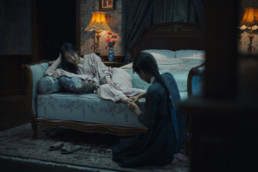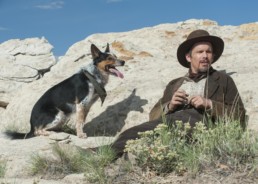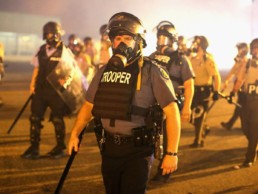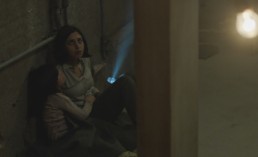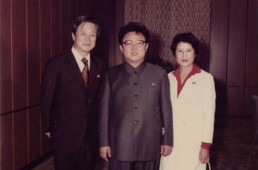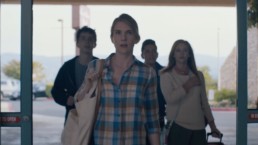'Trash Fire' Review: This Off-Kilter Horror Film is an Acquired Taste
Trash Fire is an acquired taste. It's doubtful that it will become a camp classic, although fans of off-kilter horror films may find this little flick enjoyable.
Too bad Halloween is over, the romantic comedy meets horror film Trash Fire would have been a nice addition to the campy holiday genre. The Adrian Grenier-starring film, which made its world premiere during the Midnight section of the 2016 Sundance Film Festival, doesn't quite live up to its name (and with a name like Trash, that is a good thing), although there is much to be desired in terms of overall cohesiveness and character likeability. Trash Fire may leave you thinking, WTF?– but if you can embrace the absurd then perhaps you can find some desirability here.
Immediately, writer/director Richard Bates Jr. thrusts his audience into the stylized world of a common horror film, complete with that greenish hue and monotone bass synth score. However, what is truly horrifying is witnessing the dysfunctional relationship between Owen (Grenier) and his girlfriend Isabel (Angela Trimbur). Owen is hard to sympathize with at first; his smart-ass attitude is alienating to both his relationships onscreen and the audience's relationship with him. He relentlessly insults Isabel's straight-laced, religious brother, Caleb (Matthew Gray Gubler), calling him a beige earthworm among other things. Just as the audience should give up any hope for Owen's self-reflection, Isabel's unexpected pregnancy forces him to re-examine his own childhood and attempt to make amends with his estranged younger sister, Pearl (AnnaLynne McCord).
The actual "horror"part of Trash Fire comes into play in the second half of the film. Violent flashbacks and seizures plague Owen, who grew up believing that an accidental fire he set killed both of his parents and left Pearl scarred for life. At this point in the film, the Owen we knew in the first act is completely transformed into a caring, selfless boyfriend (a major character overhaul that feels too rushed to be believable). Owen's snarky grandmother Violet (Fionnula Flanagan), whose true colors prove she is an evil woman, rounds out this crazy cast of characters.
While Trash Fire is not the type of film I typically gravitate towards, I give credit to Richard for executing his vision with intention. The color of the film is purposefully not welcoming or warm, perhaps a visual representation of Owen's discomfort with the relationships in his own life. The characters rarely converse together in the same frame, instead, addressing the camera in a medium shot. This direction, while original, feels unorganic– like the film is comprised of multiple "scenes" with a specific start and end point– rather than feeling like a fluid story.
Trash Fire is an acquired taste. It's doubtful that it will become a camp classic, although fans of off-kilter horror films may find this little flick enjoyable. But if this review can be summed up in a single image, look no further that the above picture. Grenier and Trimbur's faces say it all.
'Trash Fire' is rated R for some disturbing violence/behavior, strong sexuality, nudity, and language. 91 minutes. Now playing at the Laemmle Monica Film Center and on VOD.
'The Handmaiden' Is a Web of Lies, Deceit, and Sexual Tension
Often regarded as a Renaissance man of Korean cinema, Park Chan-wook does what all excellent filmmakers strive to do– create a technically engrossing and emotionally compelling story that resonates with its audience far after the credits are finished rolling.
"A story is all about the journey," Uncle Kouzuki says to Count Fujiwara as he cuts off the Count's fingers one by one, taking joy in the other man's pain. The sex-obsessed and domineering Uncle, while deplorable in every way, speaks a ring of truth in his observation of what makes a good story, and in the case of director Park Chan-wook's film The Handmaiden, the 2.5 hour journey we will embark on leads us through a tangled web of sexually-charged tension made even more complicated by the layers of lies and deceit, while remaining a shocking and, at its core, beautiful piece of cinema. Essentially, this is a film where predicting what will happen next is utterly pointless, so it's best to just sit back and let Chan-wook be your guide throughout this multidimensional journey.
The scene is set during the 1930's as a young Korean woman, Sookee (Kim Tae-ri), is chosen to work as a handmaiden to the young Japanese heiress Lady Hideko (Min-hee Kim). The Lady's family have all passed away, leaving her the sole proprietor of the family's fortune. Her first day on the job, Sookee meets the Lady at the beautiful, yet secluded, Korean estate where she lives with her much older Uncle Kouzuki (Jin-woong Jo)- who has made his plans of marrying her to inherit her wealth, clear. Both women are quickly drawn to each other, the lines of friendship become blurred and sexual tension arises, however, it is Sookee that is hiding an ulterior motive that may prove to be detrimental.
Before Sookee was hired as the handmaiden, she made her living as a forgery specialist and a pickpocket master. Seeing an opportunity to leave that life behind for good, Count Fujiwara (Jung-woo Ha) devised a plan to get Sookee close to the Lady, with the intention to convince the heiress to marry him instead of her Uncle. Soon after the Count and the Lady were to marry, he planned to put her in a mental hospital and keep all of her money to himself. He would give Sookee a cut of the wealth, as well as give her all of the Lady's clothes and beautiful garments. In theory, Sookee knows that following through with the plan is her ticket out of her dead-end life, however, after inadvertently growing personally attached to and starting to fall in love with Lady Hideko, she questions everything she thought she knew and wanted.
The Handmaiden is cut into three distinct parts, and what I have just described only takes place in the first act. Needless to say, there is a lot more drama than unfolds in the second and third part. The second act delves deeper into the Lady's childhood growing up alone and her relationship with her twisted uncle, a man who collects pornographic novels and forces his young niece to read them aloud to grown men. While the first act leaves the viewer with one sense of how the film is going to progress, the second act turns that theory on its head. We revisit scenes that occurred in the first act through a new lens in the second and third acts, proving that what you think you know, you really don't.
Park Chan-wook's phenomenal storytelling abilities are on heightened display here. Using the three-part structure to tell the same story through three very distinct characters gives the film a tangible sense of fullness. Scenes that seemed to be abruptly cut off at the height of sexual tension are revisited and followed through in later acts. Park Chan-wook doesn't hold back from getting graphic, but he does so in a way that doesn't feel overly pornographic for shock's sake. The energy he creates from the environment, the characters, and the situations make for one truly unforgettable viewing experience.
All of the performances are effective and wildly entertaining, but it is the debut from actress Kim Tae-ri who plays Sookee that is truly mesmerizing. Tae-ri beat out over 1,500 other actresses for the part and it is to her advantage that she had little to no acting experience prior. Her demeanor can best be likened to Belle's in Beauty and the Beast. Both have an innocence that is only intensified by their large, doe-eyes, but they are self-sufficient and have a backbone when they feel like they're in jeopardy. This may be just a coincidence, but even Sookee's outfit– a blue long-sleeved dress with a white apron– is reminiscent of the Disney princess.
If you were not familiar with Park Chan-wook's impressive filmography before The Handmaiden, (credits include Oldboy and Thirst), then you are in for a mind-blowing experience. Often regarded as a Renaissance man of Korean cinema, Park Chan-wook does what all excellent filmmakers strive to do– create a technically engrossing and emotionally compelling story that resonates with its audience far after the credits are finished rolling. The Handmaiden should serve as an example of masterfully executed cinema from both sides of the camera. Despite The Handmaiden's rather lengthy runtime with both Japanese and Korean subtitles, this is the rare occurrence where I am actually looking forward to rewatching the film again, knowing that when I do, I'll walk away with an even deeper appreciation of Park Chan-wook's unique style.
'The Handmaiden' is not rated. 144 minutes. Now playing at ArcLight Cinemas, The Landmark, Laemmle Theaters, and more.
'In a Valley of Violence' Review: An Old-School Western with Fresh, Distinct Attitude
Self-admittedly, I'm not the biggest horror fan, so my first introduction to director Ti West was at the 2013 AFI Film Festival where his thriller/horror film The Sacrament was shown during the midnight screening series. As the lights came up at the end, I felt rejuvenated– despite it being nearly 2am. There was something about the way this director works a story that kept me on the edge of my seat, from guessing at potential plot twists, to excitedly giddy when the unexpected happens. This same charisma can be felt in West's latest directorial endeavor In a Valley of Violence. A departure from his traditional safe zone of low budget horror, this in no way means that Valley lacks in the obscenely bloody department.
Ethan Hawke plays Paul, a handsome drifter who is wandering through the hot and barren desert towards Mexico with only the clothes on his back and a loyal canine companion protectively at his side, a border collie/blue heeler mix, named Abby (Jumpy). While scouting their next move, Paul discovers a shortcut through the poor and forgotten mining town of Denton, often referred to by outsiders as the "Valley of Violence." Paul quickly learns that Denton lives up to its reputation as he comes across the outspoken and brash Gilly (James Ransone), son of the town's Marshal (John Travolta), as well as his fianceé Ellen (Karen Gillan), and his equally obnoxious associates.
A fist fight between Paul and Gilly in the town's square is just the beginning of a terrible downward spiral for both the men and the town as a whole. Revenge becomes the foremost thing on their minds, and neither one plans to stop until they see the other dead. Boundaries are crossed, relationships are torn apart, and blood spews from every possible direction. However, Paul discovers that not everyone is out to get him. The young and loquacious Mary Anne (Taissa Farmiga), who happens to be Ellen's younger sister, becomes deeply infatuated with Paul's mysterious character and sees him as her ticket out of town.
West does a superb job in paying homage to the classic movies of Western Americana. From the stylized opening credits to the dramatic camera push-ins on characters and even the color grade, he sets an old-school mood with a fresh, distinct attitude. It may be that West attributes some of Valley's style to horror master Quentin Tarantino, specifically The Hateful Eight and Django Unchained. Although, with a runtime of 104 minutes (compared to 167 minutes and 165 minutes, respectively) West's pacing proves to be tighter and more succinct.
Expect to see another solid performance from Hawke, who takes his even-keeled, grungy anti-hero persona and delivers high-intensity action to the scenes that need it most. Not to be upstaged is John Travolta as The Marshal. It was truly a pleasure seeing Travolta in this role; not only did he steal scenes with his spot on comedic timing, it is generally good to see him back on the big screen. And speaking of stealing scenes– I believe Jumpy's performance as Abby the dog is the best we've seen since The Artist. Given the fact that she tucks herself into bed, takes bubble baths and a myriad of other equally impressive tricks. As the only dog cast in the role, she really is the MVP of the film.
All of this to say, Ti West's film, which he also wrote and edited, is a fantastic and original work from the guy previously known as the "horror director." West shows the film industry and fans alike what is possible when stereotypes become broken and one challenges himself creatively. As you get ready to see In a Valley of Violence this weekend (and I recommend you should), be prepared to laugh, shed a few tears, and most importantly, be ready to be entertained.
'In a Valley of Violence' is rated R for violence and language. 104 minutes. Opening at the ArcLight Santa Monica and On Demand & Digital HD Friday, October 21st.
'Do Not Resist' is An Unsettling Exposé of Those Sworn "To Serve and Protect"
On Saturday, October 8th, three Palm Springs police officers were shot after responding to a family disturbance call, a seemingly routine operation that ended up being anything but.
Jose Gilbert "Gil" Vega, 63, a 35-year veteran who was due to retire in December, and Lesley Zerebny, 27, who had just returned from maternity leave after giving birth four months earlier, were both killed as a direct result of their gun-related injuries. As tragic and shocking as this situation is, officer-involved shootings– from both sides of the gun– are no longer isolated incidents, but instead are becoming more commonplace each day. The pervasive question of "how did we get here" is what makes director Craig Atkinson's timely documentary Do Not Resist so compelling as he shines a light on the reality of American policing today, the militarization of the force, and the effect it is having on the communities they are sworn to protect.
Do Not Resist opens on the streets of Ferguson, Missouri during one of the nightly protests following Michael Brown's shooting death in 2014, where tension and emotions are at an all-time high. Atkinson and his camera become a fly on the wall as hundreds roam the streets chanting "No Justice, No Peace" and "Hands Up, Don't Shoot" while police try to control the ever-growing, increasingly hostile crowd. It's these types of scenarios that raise the question of how to ensure the safety of citizens and the officers themselves. Many seem to think that military-grade weapons, armored cars, and other various equipment will make communities a safer place, and since the federal government has given police departments more than $40 billion in military-style equipment since 9/11, access to this weaponry is so much easier.
But who is this benefitting, really? Atkinson attempts to show how citizens disagree with the choice to accept such high-powered weapons for fear that America will become a militarized war zone and in turn, the rights and free will of citizens will come second to an officer's agenda. "More Mayberry, Less Fallujah" one protestor's sign reads. Then there are those who side with law enforcement, claiming that they need these specific weapons, because "at some point, the state has warranted it." And who can blame the officers for assuming the worst in others when they are consistently being trained by those in positions of authority that they are "men and women of violence" and "violence is your weapon." Is it really any surprise then that the first reaction is to turn to military-style protection?
This issue, in general, is a divisive one, and while Do Not Resist does side with those critical of law enforcement's tactics, there is no arguing with the facts and numbers it presents onscreen. We see and hear first-hand accounts of police training seminars admiring the reputation of law enforcement in places like Mexico and Russia and acknowledging the use of city-wide CCTV cameras with software that allows the government to track people and objects. It is all extremely eye-opening and a disturbing reality check of what 21st-century American police culture looks like today.
It can all be boiled down to the age-old question: Which came first, the chicken or the egg? In this case, are extreme policing tactics to blame for the citizen's distrust of cops and subsequent violent behavior? Or is the out of control behavior of citizens the reason for such heightened and extreme police security? Attacks on and by law enforcement, in general, is nothing new, but the rate at which it continues to happen is shocking. In the Los Angeles area alone, there have been a number of fatal police shootings in South L.A., Pasadena, as well as El Cajon, to name a few. However, there are two sides to the story, and director Craig Atkinson gives us a peek into this issue in this Tribeca award-winning documentary.
Directly or indirectly, we find ourselves at a crossroads right now when it comes to trusting the police. New cases of police brutality primarily against black men, some of whom are found to be unarmed and non-threatening, seem to make headlines every other week and only further perpetuate the stereotype of the "crooked cop." Do Not Resist does not attempt to answer the question of how to solve this problem, rather, it forces one to become aware of the situation that is unfolding in our neighborhoods, affecting our family and friends, and tarnishing our nation. Just over an hour-long (any longer would have been incredibly depressing), Do Not Resist should definitely be mandatory viewing.
'Under the Shadow' Review: Exposes a Haunting Fairytale From the Quran
October is the perfect time to revisit those classic thrilling tales that run chills down your spine (for a full list of what is available to stream now, check out our What's Streaming Feature).With Halloween quickly approaching, it is time to look past the traditional werewolves and vampires, and check out the Farsi-language Iranian festival-breakout, Under the Shadow. Marrying politics of the 1980s with timeless horror, writer/director Babak Anvari's feature-length directorial debut is a fresh take on international folklore, where spooks have no bounds.
The film begins with a title card giving historical context to clarify the situation of the characters, who are living in Tehran– the epicenter of the Iran-Iraq War during the 1980's. Our protagonist is Shideh (Narges Rashidi), a wife, mother, and aspiring doctor, who is told she cannot continue her studies due to her previous involvement in political activities. Frustrated and resentful, Shideh finds herself at a crossroads when her husband Iraj (Bobby Naderi), a practicing doctor, is drafted by the army to aid wounded soldiers on the frontlines of battle. She ignores his pleas to take herself and their daughter Dorsa (Avin Manshadi) to find safety out of town and instead opts to stay home alone in their modest apartment.
Strange things begin happening in the complex like an airstrike that hits the apartment, but miraculously the missile fails to explode. Soon, personal possessions begin disappearing; for daughter, Dorsa, it is her favorite doll and for Shideh, her Jane Fonda workout VHS tape. Slowly, the once strong woman, Shideh finds herself transforming into an unstable and fearful girl. Then the hallucinations begin, making it hard to differentiate reality from a nightmare. As Shideh nears brink of insanity, she learns from a superstitious neighbor that this could be the work of Djinn, Middle Eastern spirits that travel with the wind to possess unsuspecting victims. This brings up more questions than answers, but ultimately Shideh knows that she has to face whatever is tormenting her family head on for any chance of survival.
Under the Shadow has a Sixth Sense vibe in the way that it is a psychological slow burn for most of the film, but the last 20 minutes really gets the heart rate pumping. That said, there are early moments of discomfort that fully engage the audience into caring for our protagonist. For example, Shideh choosing to stay in the house alone is the equivalent of the stereotypical scenario of a girl walking home alone through the woods at night, an obviously bad idea! Our stomach is in knots as we foreshadow the events to come, and with credit to director Babak Anvari, the events that do come are unexpected. There are no cheap tricks or forced emotional pulls here, rather, good old-fashioned mind games.
It is no surprise why Under the Shadow has been a festival favorite; not only does it take the horror genre to new heights by introducing Western audiences to Djinn, the haunting fairytale from the Quran, but it also has this refreshing feeling of a genre film done right. Narges Rashidi takes command as Shideh and her performance is powerfully affecting. Not to be out "shadowed" is her 9-year-old co-star Avin Manshadi, who makes her acting debut in this film. Solid performances coupled with an equally powerful script gives Under the Shadow all the necessary ingredients to be a staple in the horror film catalog.
'Under the Shadow' is rated PG-13 for terror, scary images, and brief language. 84 minutes. In theaters at Sundance Sunset Cinema and on VoD tomorrow, October 7th.
Review: 'Danny Says' is a Larger Than Life Look at Rock and Roll Legends
In 1980, The Ramones released their fifth studio album, End of the Century, which included the love ballad Danny Says, a departure from their typical sweaty rock and roll hits. Danny Says went on to become one of the band's more well-known songs and was covered by artists such as the Foo Fighters and Tom Waits. The titular "Danny" in the song, and in director Brendan Toller's documentary of the same name, is Danny Fields– the charismatically flamboyant manager of the Ramones, the self-appointed press agent of The Doors, and an all-around legend in the 1960's music scene.
"Danny Says" follows the career highs and lows of a self-proclaimed homosexual Jewish boy from Queens, NY, who dropped out of Harvard at 19, while pursuing a law degree. Danny had always gone against the grain as a young boy, after catching an impromptu performance of Nina Simone, he fell in love with the energy of live music. From there, he found himself rubbing shoulders with Andy Warhol and Edie Sedwick at the Silver Factory, to feeding drugs to Jim Morrison and signing The Stooges and MC5. Danny's live fast, play hard attitude makes for an incredible story which is made even more powerful with the abundance of archival footage.
Since some of the stories Danny tells don't have an actual video component, director Brendan Toller uses mixed media in the form of cartoons to better explain the narrative. This works so well on two levels; one, the cartoons are stylistically engaging and beautiful works of art even as stand-alone pieces. The second is the fact that these stories are so radically wild, the simpleness of the cartoon lets the audience focus on the story rather than get distracted by the visuals on screen. One story, in particular, is extremely effective with this directorial storytelling. Danny admits that while working at a magazine during the early part of his career, he was the one who put John Lennon's infamous comment about "The Beatles being more popular than Jesus" on the front cover, effectively responsible for the chaos that ensued which included album burning, Ku Klux Klan demonstrations, and radio boycotts all aimed at the most popular band of the times.
For as many interesting stories as Danny and the film tell, it can get a bit frustrating to battle the spotty audio quality. There are times when we are straining to hear past the interviewee's echo, and that can test the attention span. However, one should definitely look past those brief moments for maximum enjoyment. The film is very conversational in nature, similar to the 2013 documentary "Supermensch: The Legend of Shep Gordon," giving the audience the opportunity to see Danny Fields in his true form, up close and personal.
Fans of the short-lived HBO series "Vinyl" will definitely enjoy seeing this real life Richie Finestra retell his stories of drug-infested parties and late night shenanigans with the biggest stars in rock and roll. In the beginning, Fields was just another Silver Factory party boy who thought he had made it big when Nico crashed his house party. To hear and see his evolution to one of the most influential names in rock and roll history is not only an entertaining watch, it is an essential one.
"Danny Says" is not rated. 104 minutes. Opening at Sundance Sunset Cinemas and VOD this Friday, September 30th.
Movie Stars Captured by Their Biggest Fan in 'The Lovers and the Despot'
In May of 2015, episode #556 of the podcast This American Life, host Ira Glass told a story about two South Korean nationals, both celebrities in the filmmaking world, and the harrowing tale of kidnapping and brainwashing at the hands of North Korean dictator Kim Jong-il, and also their Hollywood-style escape. Listening to the podcast, my mind raced with thoughts– mostly second guessing every other sentence because there is no way this could be a true story, right? Directors Ross Adam and Robert Cannan take this fascinating historical case and add visuals and firsthand accounts to the story, making it one of the year's most terrifying films in "The Lovers and the Despot."
The lovers, in this case, are South Korean filmmaker Shin Sang-ok and actress Choi Eun-hee. They met on a movie set in the 70's and fell in love, however, relationships in the film industry are hard to sustain (just ask Brangelina), and the two eventually divorced after Shin fathered two children with his mistress. As their relationship is crumbling, across the water in North Korea, movie buff and despot Kim Jong-il complains about the state of his country's film industry, particularly the excessive crying scenes. "This isn't a funeral. Is it?" he demands. Upset that North Korean films have been overlooked by the global film festival circuit, he asks how he can get the famous Shin Sang-ok and Choi Eun-hee over to his country to rebrand the flailing movie business. It is then that their fate has been decided.
What follows is an outlandish story that seems like a script to a Hollywood blockbuster rather than the actual account. Choi and Shin were kidnapped separately, sent to Kim Jong-il, where they became his personal filmmakers. The duo always planned to escape, but necessary for their survival, it couldn’t be until the time was right. In the meantime, they knew they had to adhere to his fascist regime. The duo went on to make 17 feature films before they finally found an opportunity to escape.
Perhaps the craziest thing of all is the fact that what makes all of this true hangs on one piece of evidence: taped recordings of Kim Jong-il planning the capture of Shin and Choi. We hear those tapes for the first time and it is enough to send chills down one's spine. Without saying how the tapes were obtained, we are told it was a "source" who smuggled them out which adds another layer to the mystery!
With a story like this, the interviews should carry the film with very little reliance on distractive filmmaking. For the most part, Adam and Cannan stick to this method of cinematic subtlety. Interviewees include Choi, her adoptive son and daughter, and other government and undercover officials. To visualize their journey, the directors use clips from Shin's previous films, which can get confusing at times as to whether or not what we're watching is a dramatization or the actual footage. Gaining access behind North Korea's guarded gates is a rare feat on its own, and the glimpses of daily life seen in the film are some of the most powerful visuals. Out of control weeping at Kim Jong-il's funeral, manic zealousness at Kim Jong-un's inauguration, it is all so absurd and must be seen to be believed.
"The Lovers and the Despot" is not rated. 98 minutes. Opening at the Laemmle in Santa Monica on Friday.
'Miss Stevens' a Satisfying Film in Front Of and Behind the Camera
Coming off of a successful festival run, including a Best Actress win for Lily Rabe at this year's SXSW Film Fest, "Miss Stevens" is finally hitting select theaters Friday, September 16th. This tightly knit independent film is Julia Hart's directorial debut, and although she may not have many hits on her IMDb page (past credit includes screenwriter of "The Keeping Room"), Hart puts her uniquely understated directorial style on display in "Miss Stevens."
29-year-old high school English teacher Miss Stevens (Lily Rabe) is clearly going through a personal crisis, but nevertheless, is obligated to chaperone the drama club as they enter a weeklong competition. Trying not to let her worries bring her down, she actively engages in conversation with the three students during the hours-long car ride. Margot (Lili Reinhart) the overachiever and Sam (Anthony Quintal) the flamboyant talkative one, begin to develop a special personal relationship with Miss Stevens, but it is Billy (Timothée Chalamet) the slacker, who ends up taking his feelings to the next level. With her emotional guard down, Miss Stevens finds comfort in Billy's charm. Despite not being romantically interested in him, she soon realizes that this source of happiness is causing the lines betweenstudent/teacher relationship to get blurred.
The storyline is simple enough, and no, Miss Stevens is not a modern day Mrs. Robinson. She is a woman with troubled thoughts, although it takes well over the first 50 minutes to figure out just what her struggles are. Until we reach that clarity, there is consistent questioning as to what her story is, which becomes a bit tiring. Stevens often comes off as disinterested and distracted and if our main character doesn't even seem to be invested in her life, it’s difficult for the audience to care. However, the film does hit its stride after the revelation and subsequent reactions from those around her. Strong performances from Chalamet and Reinhart add liveliness and charisma, a perfect balance to Rabe's passiveness.
For as relatively little experience in the industry as Julia Hart has, she's managed to create an emotionally palpable movie that is relatable to anyone who remembers their favorite grade school teacher. Realizing that teachers had lives outside of the classroom (and even first names!) was a concept that seemed incomprehensible, and Hart executes this feeling exceptionally. With an underlying theme of lack of funding for the arts, this film hits all the right notes. It may not come off as very warm or funny despite its being billed as a comedy, yet “Miss Stevens” is a satisfying film both in front of and behind the camera.
"Miss Stevens" is not rated. 86 minutes. Opening at the Sundance Sunset this Friday and will be available on VOD September 20th.


